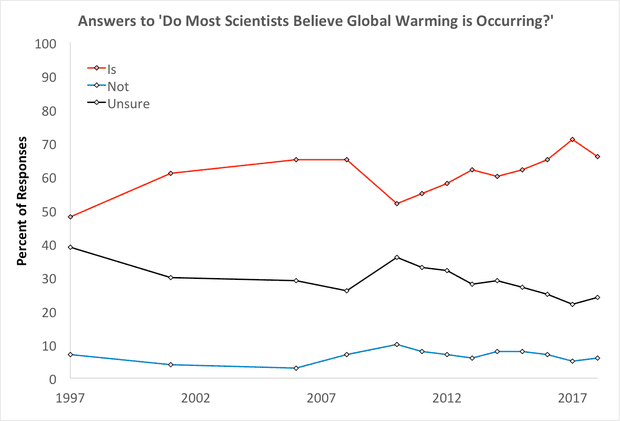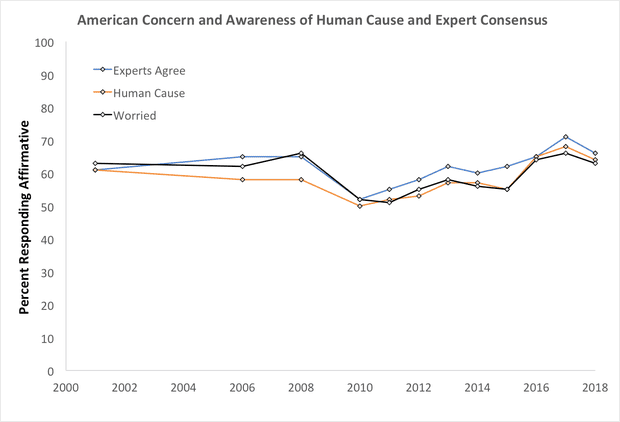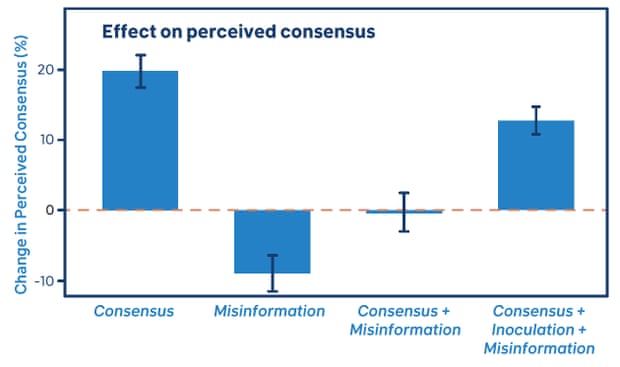Gallup released its annual survey on American perceptions about global warming last week, and the results were a bit discouraging. While 85–90% of Democrats are worried about global warming, realize humans are causing it, and are aware that most scientists agree on this, independents and Republicans are a different story. Only 35% of Republicans and 62% of independents realize humans are causing global warming (down from 40% and 70% last year, respectively), a similar number are worried about it, and only 42% of Republicans and 65% of independents are aware of the scientific consensus – also significantly down from last year’s Gallup poll.
The Trump administration’s polarizing stance on climate change is probably the main contributor to this decline in conservative acceptance of climate change realities. A recent study found evidence that “Americans may have formed their attitudes [on climate change] by using party elite cues” delivered via the media. In particular, the study found that Fox News “is consistently more partisan than other [news] outlets” and has incorporated politicians into the majority of its climate segments.
Americans are gradually becoming better-informed
Nevertheless, public awareness about climate change realities has improved over the long-term. For example, about two-thirds of Americans now realize that most scientists agree global warming is occurring, up from less than half in 1997.

Responses to Gallup survey question asking whether most scientists believe global warming is occurring. Illustration: Dana Nuccitelli
There’s also a strong correlation between awareness of the expert consensus, that humans are causing global warming, and concern about the issue. This suggests that when people are aware that experts agree, they accept the consensus and realize we need to address the problem. This is consistent with research finding that the expert consensus is a ‘gateway belief’ leading to public support for climate action.

Responses to Gallup survey questions asking whether scientists agree global warming is occurring (blue), whether humans are responsible (orange), and whether respondents are worried about it (black). Illustration: Dana Nuccitelli
There’s a handbook for that
John Cook and Stephan Lewandowsky, who previously published The Debunking Handbook, teamed up with Sander van der Linden and Edward Maibach to write The Consensus Handbook. It’s a concise and definitive summary of everything related to the expert climate consensus, including how we know 90–100% of climate scientists agree on human-caused global warming, efforts to manufacture doubt about the consensus, its role as a gateway belief, its neutralizing effect on political ideology, and how to inoculate people against misinformation.
Those last points are particularly important in light of the Gallup survey data. There’s an intense battle over public opinion on climate change, with cues from political elites having a polarizing effect that’s largely offset when people become aware of the expert consensus.
Thus, there’s been a concerted campaign to misinform people about the consensus. That was a key issue that major oil companies accepted in a recent court case, while their fossil fuel-funded supporters denied the consensus in briefs submitted to the court. Meanwhile, the Trump EPA is distributing misleading statements about scientific uncertainty on climate change, helping create this tribal identity that ‘Team Conservative’ denies the realities and dangers associated with human-caused global warming.
However, as the Consensus Handbook discusses, research has shown that inoculating people against misinformation can largely offset its influence.

The effect of different types of messages about climate change. Illustration: The Consensus Handbook.
The bad news is that misinformation can totally offset the influence of facts on topics like the expert consensus on human-caused global warming. The good news is that people don’t like being fooled, so when they’re additionally informed about the tactics used to trick them with misinformation, they’re more likely to accept the facts.
Some are polarized, but many are simply unaware
The challenge is that politicians on Fox News and other media outlets are able to reach a wide audience with their polarizing messages about climate change. Reaching a similarly sized audience not only with facts but also inoculation against the misinformation is a daunting task. However, as John Cook notes,
from Skeptical Science https://ift.tt/2GDUVHH
Gallup released its annual survey on American perceptions about global warming last week, and the results were a bit discouraging. While 85–90% of Democrats are worried about global warming, realize humans are causing it, and are aware that most scientists agree on this, independents and Republicans are a different story. Only 35% of Republicans and 62% of independents realize humans are causing global warming (down from 40% and 70% last year, respectively), a similar number are worried about it, and only 42% of Republicans and 65% of independents are aware of the scientific consensus – also significantly down from last year’s Gallup poll.
The Trump administration’s polarizing stance on climate change is probably the main contributor to this decline in conservative acceptance of climate change realities. A recent study found evidence that “Americans may have formed their attitudes [on climate change] by using party elite cues” delivered via the media. In particular, the study found that Fox News “is consistently more partisan than other [news] outlets” and has incorporated politicians into the majority of its climate segments.
Americans are gradually becoming better-informed
Nevertheless, public awareness about climate change realities has improved over the long-term. For example, about two-thirds of Americans now realize that most scientists agree global warming is occurring, up from less than half in 1997.

Responses to Gallup survey question asking whether most scientists believe global warming is occurring. Illustration: Dana Nuccitelli
There’s also a strong correlation between awareness of the expert consensus, that humans are causing global warming, and concern about the issue. This suggests that when people are aware that experts agree, they accept the consensus and realize we need to address the problem. This is consistent with research finding that the expert consensus is a ‘gateway belief’ leading to public support for climate action.

Responses to Gallup survey questions asking whether scientists agree global warming is occurring (blue), whether humans are responsible (orange), and whether respondents are worried about it (black). Illustration: Dana Nuccitelli
There’s a handbook for that
John Cook and Stephan Lewandowsky, who previously published The Debunking Handbook, teamed up with Sander van der Linden and Edward Maibach to write The Consensus Handbook. It’s a concise and definitive summary of everything related to the expert climate consensus, including how we know 90–100% of climate scientists agree on human-caused global warming, efforts to manufacture doubt about the consensus, its role as a gateway belief, its neutralizing effect on political ideology, and how to inoculate people against misinformation.
Those last points are particularly important in light of the Gallup survey data. There’s an intense battle over public opinion on climate change, with cues from political elites having a polarizing effect that’s largely offset when people become aware of the expert consensus.
Thus, there’s been a concerted campaign to misinform people about the consensus. That was a key issue that major oil companies accepted in a recent court case, while their fossil fuel-funded supporters denied the consensus in briefs submitted to the court. Meanwhile, the Trump EPA is distributing misleading statements about scientific uncertainty on climate change, helping create this tribal identity that ‘Team Conservative’ denies the realities and dangers associated with human-caused global warming.
However, as the Consensus Handbook discusses, research has shown that inoculating people against misinformation can largely offset its influence.

The effect of different types of messages about climate change. Illustration: The Consensus Handbook.
The bad news is that misinformation can totally offset the influence of facts on topics like the expert consensus on human-caused global warming. The good news is that people don’t like being fooled, so when they’re additionally informed about the tactics used to trick them with misinformation, they’re more likely to accept the facts.
Some are polarized, but many are simply unaware
The challenge is that politicians on Fox News and other media outlets are able to reach a wide audience with their polarizing messages about climate change. Reaching a similarly sized audience not only with facts but also inoculation against the misinformation is a daunting task. However, as John Cook notes,
from Skeptical Science https://ift.tt/2GDUVHH

Aucun commentaire:
Enregistrer un commentaire